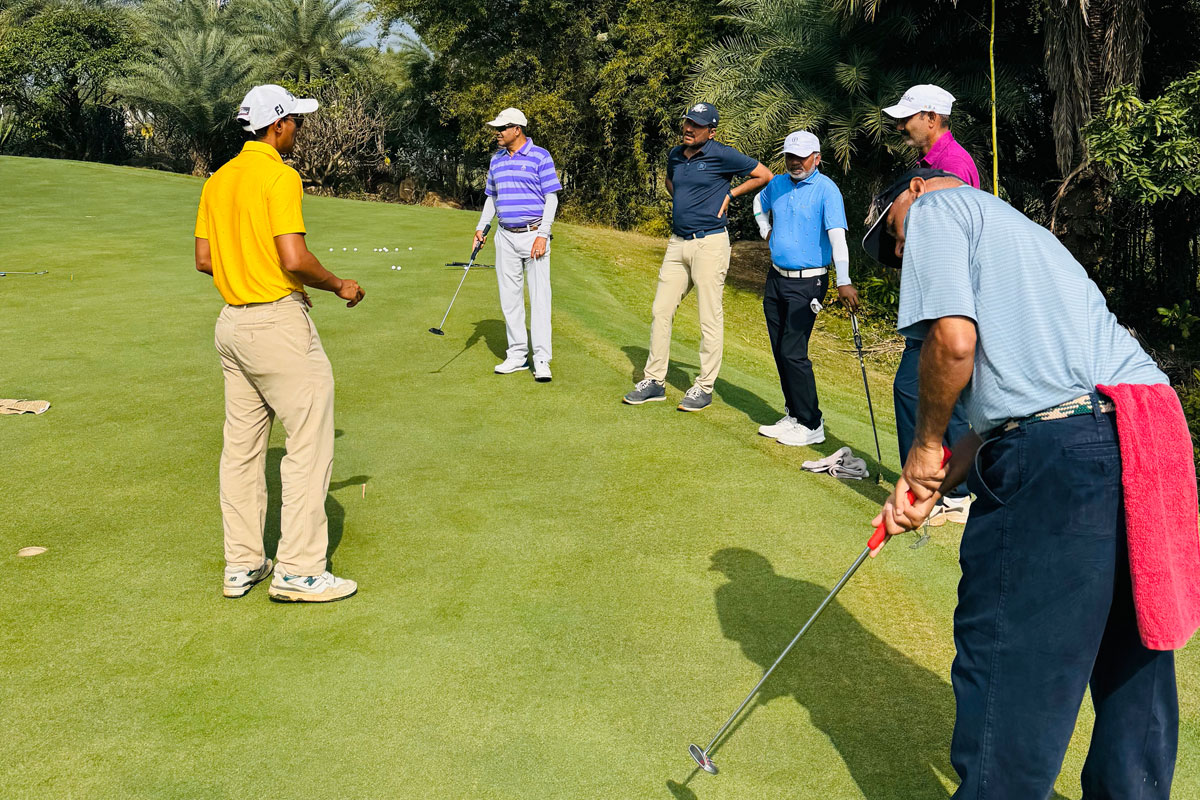We at Tarun Sardesai Golf Academy (TSG) consistently stress the value of organized tournament preparation and post-game analysis. An effective tournament debrief enables golfers to evaluate their performance, identify errors they made, and improve their strategy for the following rounds.
How to approach a tournament debrief
Golf tournaments, particularly those that last for more than one day, require more mental toughness, effective planning, and a lot of consistency. The secret to improving one’s performance during an event is assessing the round on certain parameters and then assessing the tournament overall too. Both practices go hand in hand and require a consistent effort to see results event after event.
So, let’s check out the most effective way to deal with self-improvement in any competition.
Identify the shots that did not go as planned
Identifying and recording each round’s shots that did not go as planned is the very first step in an effective tournament debrief. Remembering the shots after every round is not a tough thing. A player always remembers the shots he has played.
Once you’ve identified the shots that you feel you did not hit well, categorize them into two main types:
- Mental Errors – These are the mistakes caused by pressure, fear, or nerves.
- Technical Errors – These are the errors that can occur due to flaws in your swing mechanics, grip, or some other technical aspects.
For instance, if you are nervous for whatever reason – maybe a lot of people are watching, or lets say, if you have hooked a shot on the left side because there was an object on the right – generally due to the nervousness that you might land up making an error. Therefore, you can identify this as a mental error as it occurred when your mind detected the object as a hindrance. On the contrary, if the same situation arises and this time there is no object on the right, then this is a matter of technique.. Or say, you are hooking on drives, and it happens consistently on the seventh or eighth drive, these can be clearly categorized as technical errors.
But what if you were not able to differentiate between the two?
If this error identification is not done by a player, it will not be a favourable situation the next day. Errors are human, but as a player you have to become smart. . If you are notable to judge a bad shot as a technical or mental error, you will probably land up wasting your practice session after the round by working in the wrong direction. For example you have hooked three-four drives, and the error was a mental error but you were not able to identify it, then you would go to the range after the round and hit thirty-forty balls working on technique.
Is this a wise choice?
Absolutely not!
Such scenarios call for a mental strengthening session and not technique strengthening. This could have been resolved with maybe five-six practice shots after the round. But if you go about it the other way, by hitting 30-40 shots, without considering that the actual hindrance was not technical but mental the next day, you’ll probably end up making the same mistake. Hence, the right classification of errors becomes crucial so that the next day can be dealt with better.
Implementing an Effective Correction Strategy to play better the next day
Once this categorization is done, the next thing you have to do is implement an effective strategy to improve on the errors.
If your errors are mostly mental:
- Go to the practice area and hit five to seven shots while concentrating solely on your mental tranquility and pre-shot ritual.
- Instead of practicing too much, strengthen your visualization skills and confidence.
If your errors are mostly technical:
- Increase your practice time by hitting about 50 shots and concentrating on consistency and mechanics.
- Take notes on the issues that occurred.
- Speak with your coach for advice on enhancing your performance.
This method of classifying errors works for all shots, including free swings, 3-footer shots, power putts, and even the birdie attempts.Such Methodical debriefing is key to better performance.
Using the TSG Student Portal for Smarter Game Analysis
To make game analysis easier for our golfers, TSG offers them a smart and easy-to-use digital platform. Our golfers can effectively track tournament data and their performance trends using our TSG Student Portal. We highly encourage our players to keep-up with this platform so that every single shot they hit can be analyzed accurately over a period of time.
This doesn’t take much time and is super-easy to maintain. Not only does this data help students get a closer look at performance, but for us as coaches, this serves as a roadmap to further strategy.
In addition to improving performance, a well-organized tournament debrief also increases mental toughness and self-awareness. Our golfers are encouraged at TSG to adopt this debriefing strategy, include it in their training regimen, and use intelligent tools like the TSG Student Portal to track their games efficiently.
Mental Discipline:
With just 1s and 0s, you can track and analyze mental patterns during tournaments with TSG’s Mental Discipline (MD) Report. A student can give himself a 1 if he was strong on the mental front during a shot, if he was able to finish strong, did your pre-shot routine well, had good body language and was in a calm state of mind through the shot. In addition to determining whether errors were technical or mental, this method provides a better understanding of a student’s on-course thinking. By looking over this data, coaches and players create more individualized and targeted practice plans, which will improve mental control and tournament results.
We hope this was insightful for every golfer heading into tournaments.
Happy Golfing!



